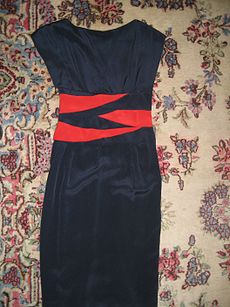Haute couture
Haute couture (pronounced 'OHT koo-TOOR') is a French term for high fashion. It refers to the creation of exclusive custom-fitted clothing. The term refers to:
- the fashion houses or fashion designers that create exclusive and often trend-setting fashions.
- the fashions created by them.



Haute couture is made to order for a specific customer. It is usually made from high-quality, expensive fabric and sewn with extreme attention to detail and finish by the most experienced and capable seamstresses, often using time-consuming, hand-executed techniques. Couture is a common abbreviation of haute couture.[1]
In France, haute couture is une appellation juridiquement protégée (a legally protected name). It may only be used by firms which meet certain well-defined standards. The term is also used to describe all high-fashion custom-fitted clothing in other 'fashion capitals' such as Milan, London, New York, Tokyo and Madrid.
History
changeThe couturier Charles Frederick Worth (13 October 1826–10 March 1895), is widely considered the father of haute couture as it is known today.[2][3] Although born in Lincolnshire, England, Worth made his mark in the French fashion industry. He revolutionized how dressmaking was organised. Worth made it so the dressmaker became an artist: a fashion designer. He created one-of-a-kind designs to please his titled or rich customers. More importantly, he prepared designs which were shown on live models at the House of Worth. Clients selected a design, specified colours and fabrics, and had a version tailor-made in Worth's workshop. Worth combined individual tailoring with a standardization more characteristic of the ready-to-wear clothing industry, which was also developing during this period.
Chambre syndicale
changeTo earn the right to call itself a couture house and to use the term haute couture, members of the Chambre syndicale de la haute couture must follow these rules:
- Design made-to-order for private clients, with one or more fittings.
- Have a workshop (atelier) in Paris that employs at least fifteen people full-time.
- Each season (that's twice a year), present a collection to the Paris press, with at least thirty-five runs/exits with outfits for both daytime wear and evening wear.
Membership is seldom given. Outside the Chambre syndicale are many successful fashion houses which deal in prêt-à-porter (the French term for ready-to-wear fashion). They have their own Chambre syndicale du prêt-à-porter.
Related pages
changeReferences
change- ↑ "What is Couture?". Retrieved 2009-08-08.
- ↑ Jacqueline C. Kent 2003. Business builders in fashion - Charles Frederick Worth - the father of haute couture The Oliver Press.
- ↑ Claire B. Shaeffer 2001. Couture sewing techniques "Originating in mid- 19th-century Paris with the designs of an Englishman named Charles Frederick Worth, haute couture represents an archaic tradition of creating garments by hand with painstaking care and precision". Taunton Press 2001.